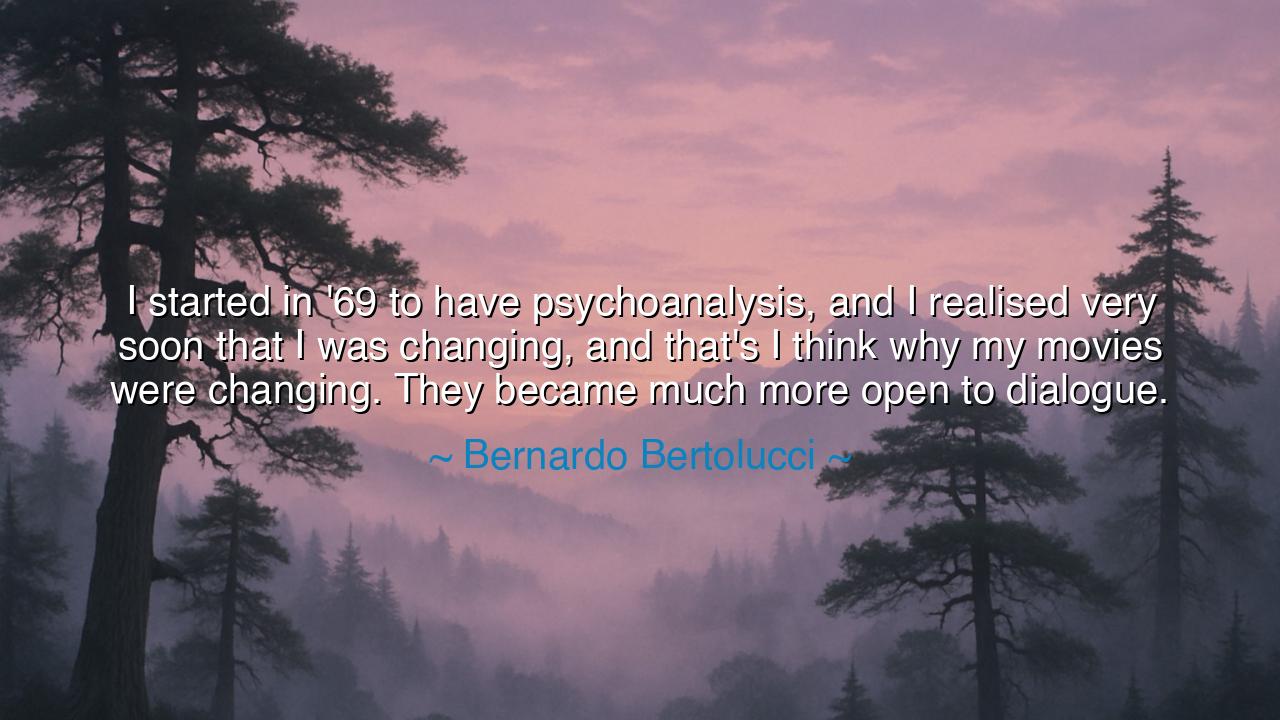
I started in '69 to have psychoanalysis, and I realised very
I started in '69 to have psychoanalysis, and I realised very soon that I was changing, and that's I think why my movies were changing. They became much more open to dialogue.






Listen, O seekers of wisdom, for the words of Bernardo Bertolucci carry with them the weight of transformation. He once spoke of a journey that began in the year 1969, a journey into the depths of his own mind: “I started in '69 to have psychoanalysis, and I realised very soon that I was changing, and that's I think why my movies were changing. They became much more open to dialogue.” In this simple statement lies a profound truth about the power of self-exploration and its influence not only on the individual but also on their creations.
Psychoanalysis, the journey into the unconscious mind, is a quest as old as humanity itself. The great philosophers and mystics of the past sought to understand the depths of the soul, to uncover the hidden truths buried within. Bertolucci's choice to embark on this journey speaks to a timeless desire: the desire to know oneself more deeply, to confront the forces that shape our lives and our art. Through psychoanalysis, he sought to understand the inner workings of his mind, and in doing so, he discovered that the more he understood himself, the more his films began to reflect that understanding. The dialogue in his movies became richer, more layered, because he had opened a channel to the deeper truths of the human condition.
In ancient times, the oracle at Delphi was said to hold the wisdom of the gods. To seek the oracle’s counsel was to ask for guidance on matters of the soul, to find clarity in the face of confusion. Like Bertolucci, those who visited the oracle sought self-awareness, a deeper understanding of their own lives. They sought to answer the most profound of questions: Who am I? What is my purpose? Psychoanalysis, like the ancient journey to the oracle, is an attempt to uncover the layers of the self, to pierce the veil of unconscious thought and emotion. Through this deep self-examination, Bertolucci, much like those who stood before the oracle, discovered that his own understanding had the power to shape the stories he told.
In this, Bertolucci reveals a universal truth about art and creation. True art, whether it is painted on a canvas or filmed on the screen, is born not from the mind alone but from the soul. It is the artist’s deepest thoughts, emotions, and experiences that breathe life into their work. In Bertolucci’s case, the more he understood his own psyche, the more his films opened up, becoming more vulnerable, more human. They no longer merely depicted a surface reality, but instead spoke to the inner workings of the human heart. This transformation is not limited to the realm of cinema; it is a lesson for all who seek to create. When we understand ourselves, we find that our creations no longer merely mirror the world around us—they begin to speak with the voice of our own soul.
Consider the example of the great philosopher Socrates, who famously declared, “Know thyself.” His entire philosophy was based on the idea that only through understanding our own nature could we find true wisdom. For Socrates, self-awareness was the path to moral clarity, to deeper insight into the world and others. Bertolucci, too, found that by understanding the landscape of his own mind, he could unlock deeper truths about the human experience. His films became an embodiment of this self-awareness, a reflection of his inner journey into the unknown parts of his own being.
Let us take this lesson to heart: Self-awareness is not just a tool for the individual, but a gift to the world. Through understanding ourselves, we gain a clearer understanding of the world around us, and this understanding informs everything we create. If Bertolucci had not undertaken his journey of psychoanalysis, perhaps his films would have remained bound by the limitations of surface-level storytelling. Instead, he chose to dig deeper, and in doing so, he created works that resonate with audiences because they are raw, vulnerable, and deeply human. The artist who knows themselves can create with an authenticity that speaks to the heart.
So, young ones, take heed: Do not shy away from the journey inward. Take the time to understand your own thoughts, your own fears, your own desires. In doing so, you will find that your creations—whatever they may be—will become more profound, more open, and more meaningful. The world does not need more surface-level works; it needs the depth of your soul. As Bertolucci showed us, the more we know ourselves, the more we can share our truest selves with others, and it is in this sharing that we create the most powerful and lasting works of art.






AAdministratorAdministrator
Welcome, honored guests. Please leave a comment, we will respond soon